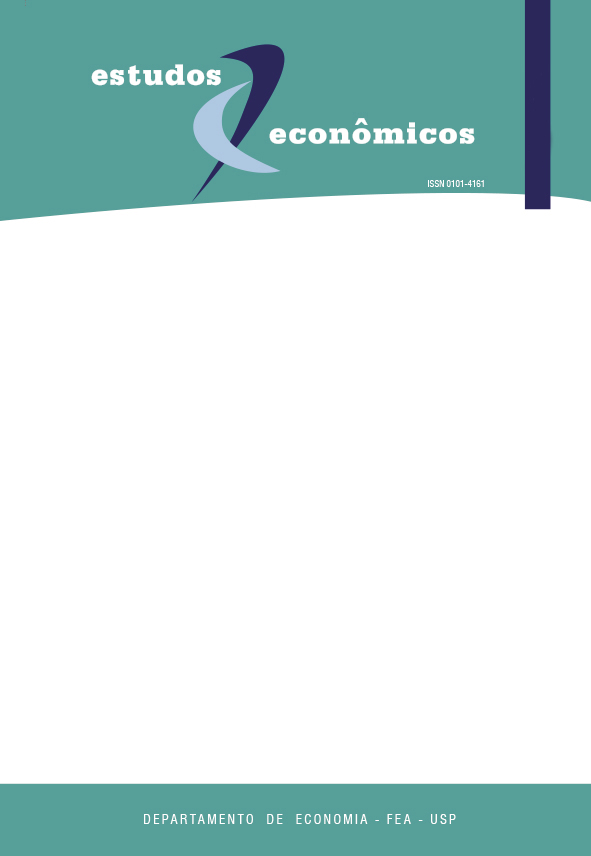Higher education: free tuition vs. quotas vs. targeted vouchers
DOI:
https://doi.org/10.1590/S0101-41612010000100002Keywords:
educational finance, educational vouchers, efficiency, human capitalAbstract
This paper compares theoretically three alternative university systems: the current one adopted in Brazil, in which students who perform better in the entering exam obtain the right to attend the public university without paying the full tuition; a system of affirmative action quotas in public universities, to benefit low income students; and a targeted vouchers system that can be used either to pay private or public university tuiton. The comparison indicates that the last system leads to: (i) a higher quality of the labor force; (ii) a more efficient allocation of resources; and (iii) a greater social mobility.
Downloads
References
Albrecht, D.; Ziderman, A. Funding mechanisms for higher education. World Bank Discussion Papers, 153, 1992.
Arcidiacono , P.; Nicholson, S. Peer effects in medical schools. Journal of Public Economics, 89, p.327-350, 2004.
Andrade , E. Growth, distribution, and school policy. 1998. (Doctoral Dissertation) - University of Chicago.
Andrade , E. Quotas in Brazilian public universities: good or bad idea? Revista Brasileira de Economia, out./dez. 2004.
Andrade , E.Targeted vouchers and its effects. 2009. (Mimeo).
Andrade , E.; Moita , R.; Silva , C. Peer effect and competition in higher education. 2009. (Mimeo).
Caucutt , E.; Kumar, K. Higher education subsidies and heterogeneity: a dynamic analysis. Journal of Economic Dynamic & Control, 27, p. 1459-1502, 2003.
Chen, Z.; West, E. Selective versus universal vouchers: modeling median voter preferences in education. American Economic Review, v. 90, n. 5, 2000.
Cunha, F.; Heckman, J.; Lochner, L. ; Masterov , D. Interpreting the evidence on life cycle skill formation. NBER Working Paper, 11331, 2006.
Cunha , F.; Heckman , J. The economics and psychology of inequality and human development. NBER Working Paper, 14695, 2009.
Dale , S.; Krueger , A. Estimating the payoff to attending a more selective college: an application of selection on observables and unobservables. NBER Working Paper, 7322, 1998.
Friedman, M. Capitalism and freedom. Chicago University Press, 1962.
Gallego, F.; Hernando, A. On the determinants and implications of school choice: semi-structural simulations for Chile. Economia; Fall, 2008.
Holzer, H.; Neumark, D. Assessing affirmative action. Journal of Economic Literature, September, v. 38, iss. 3, 2000.
Ladd, H. School vouchers: a critical view. Journal of Economic Perspectives, v. 16, n. 4, Fall, 2002.
Lopez -Acevedo , G.; Salinas , A. The distribution of Mexico's public spending on education. Policy Research Working Paper 2404, The World Bank, 2000.
Malledo, J.; San Segundo, M. La financiación de la enseñanza superior: un análisis comparado de la situación española. Papeles de Economia Española, n. 86, 2000.
McEwan , P.; Urquiola , M.; Vegas , E. School choice, stratification, and information on school performance: lessons from Chile. Economia, Spring, 2008.
Neal , D. How vouchers could change the market for education. Journal of Economic Perspectives, v. 16, n. 4, Fall, 2002.
Rozada , M.; Menendez , A. Public university in Argentina: subsidizing the rich? 2000. (Mimeo).
Sacerdote , B. Peer effects with random assignment: results from Darthmouth Roomates. Quarterly Journal of Economics, 116, p. 681-704, 2001.
Sandstrom, F.; Bergstrom, F. School vouchers in practice: competition will not hurt you. Journal of Public Economics, 89, 2005.
Stoke y, N. Free trade, factor returns, and factor accumulation. Journal of Economic Growth, v. 1, iss. 4, p. 421-447, December 1996.
Veloso , F.; Ferreira , S. A reforma da educação. In: Pinheiro, A.; Giambiagi , F. (Org.). Rompendo o marasmo - a retomada do desenvolvimento no Brasil . Editora Campus, 2006.
Zimmerman, D. Peer effects in academic outcomes: evidence from a natural experiment. The Review of Economics and Statistics, v. 85, n. 1, p. 9-23, 2003.
Downloads
Published
Issue
Section
License
Copyright (c) 2010 Eduardo de Carvalho Andrade

This work is licensed under a Creative Commons Attribution-NonCommercial 4.0 International License.
By submitting an article, the author authorizes its publication and attests that it has not been submitted to any other journal. The original article is considered final. Articles selected for publication are proofread for grammatical and orthographic errors. The journal does not pay rights for published articles. The Institute of Economic Research from the School of Economics, Business and Accounting of the University of São Paulo (Instituto de Pesquisas Econômicas da Faculdade de Economia, Administração e Contabilidade da Universidade de São Paulo) owns the journal's copyright.




